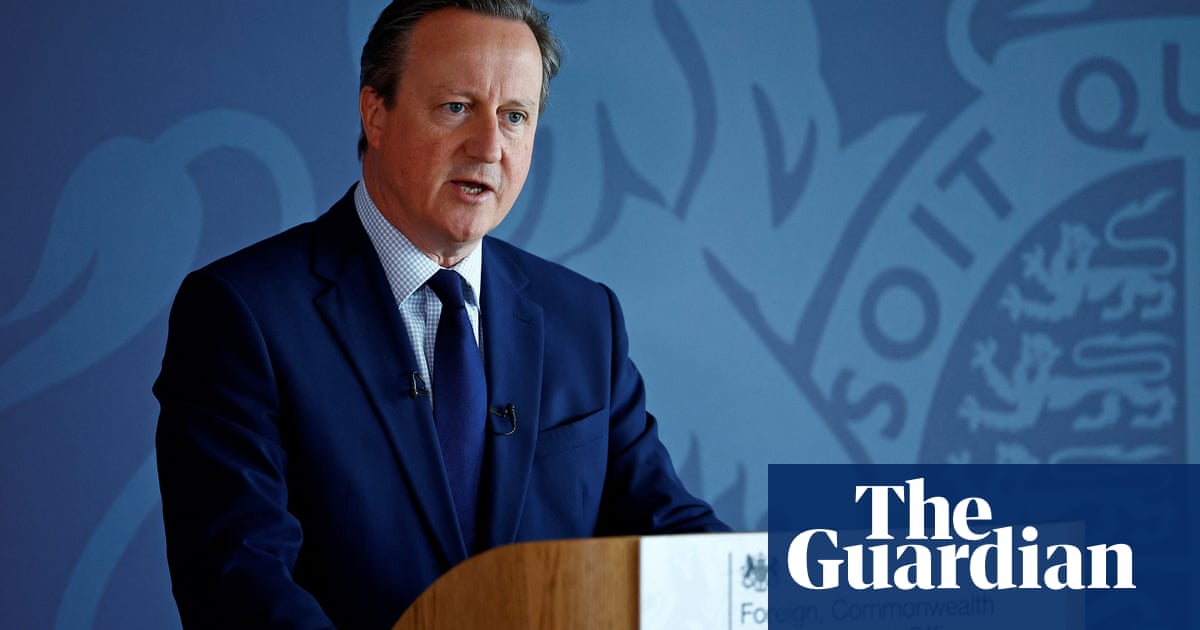


David Cameron has said the UK will not be withholding arms sales to Israel, saying its position is not comparable with that of the US, which has paused the delivery of a weapons shipment, since the UK is not a large state-to-state arms supplier to Israel.
The foreign secretary added that the UK did not support a large-scale invasion of Rafah unless it saw a plan that protects civilians, a position the UK has repeated for the past month.
Foreign Office officials said they had no view as to whether Hamas or Israel were closer to the UK position of a two-stage ceasefire, starting with a humanitarian ceasefire and leading to a permanent cessation. They pointed out that Israel claimed the offer accepted by Hamas on Sunday differed from the one Israel had been prepared to accept the week before.
Taking questions at the end of a lengthy speech setting out his foreign policy vision after six months in the job, Cameron said: “There’s a very fundamental difference between the US situation and the UK situation.
“The US is a massive state supplier of weapons to Israel. We do not have a UK government supply of weapons to Israel, we have a number of licences, and I think our defence exports to Israel are responsible for significantly less than 1% of their total. That is a big difference.
“On Rafah, we are clear that we would not support some major operation in Rafah unless there was a very clear plan for how to protect people and save lives, and all the rest of it.
“We have not seen that plan, so in the circumstances we will not support a major operation in Rafah.
“We have very clear licensing procedures, some of the toughest and most rigorous in the world. We follow them through very closely and that’s what we’re doing, and will continue to do, in the period ahead.”
The US president, Joe Biden, overnight hardened the US position by saying it would not be supplying arms for use in population centres.
UK officials were unwilling to describe what Israel would have to do in Rafah to be deemed to have crossed a red line, but it appears a ground invasion would be seen as a breach of international humanitarian law.
Cameron said he remained focused on improving the flow of humanitarian aid into Gaza and said the position was improving with the opening of the Rafah crossing on Thursday and the delivery of aid.
Cameron’s claim that UK arms sales are not the same as those from the US to Israel could be challenged on the basis that the scale or supplier of the arms is immaterial, and the issue is whether the arms are being used in a way that could conflict with UK legal criteria about a risk of a serious breach of international humanitarian law.
Foreign Office officials said the next formal assessment of UK arms sales and the risk the arms may be used to commit a serious breach was imminent. The formal assessments are made on a six-week cycle, and the last assessment was completed at the end of March.
In the main part of his speech, Cameron argued the UK and its allies had to show more courage in facing down adversaries in “a moment of peril”.
Cameron said the west was in “a battle of wills” with an authoritarian cabal that believed “they can outlast us, can endure more pain, make more sacrifices”, and he insisted that “we in Britain, and in the wider west, have agency. The question is whether we have the courage to use it.”
He challenged the isolationist mood in the US and elsewhere, saying those who believed in focusing only on domestic concerns were “profoundly wrong since what happens abroad matters directly to our citizens”.